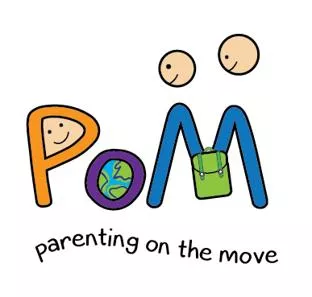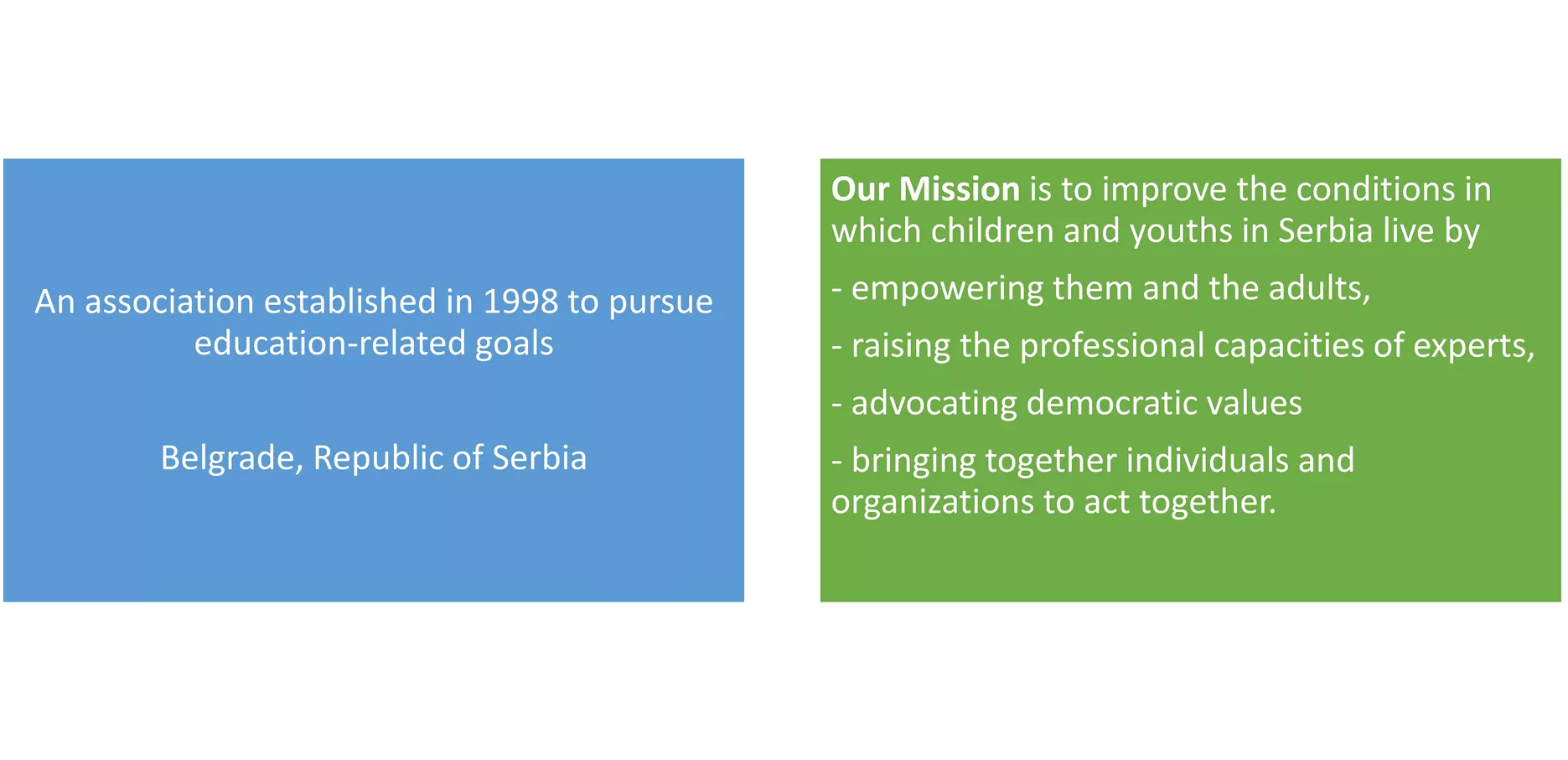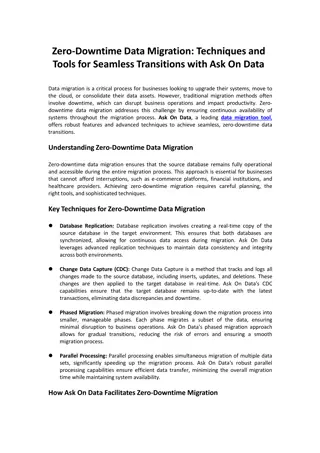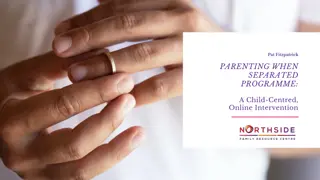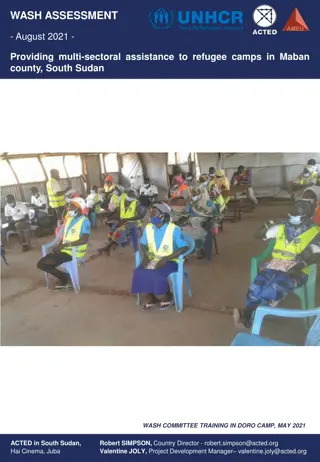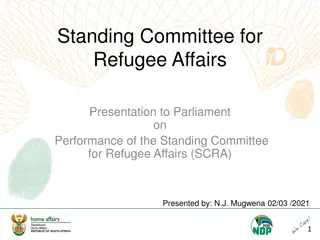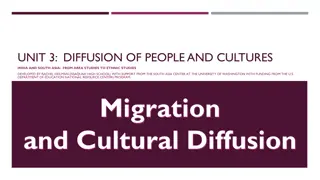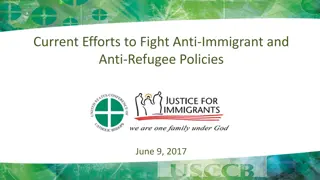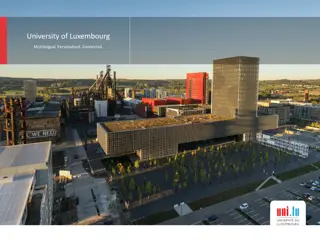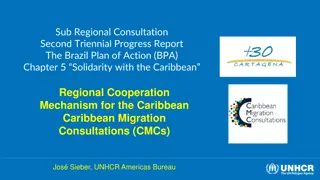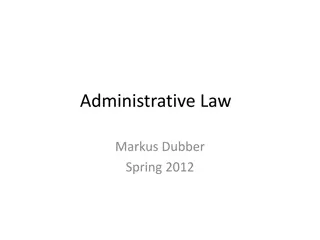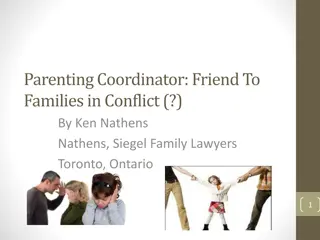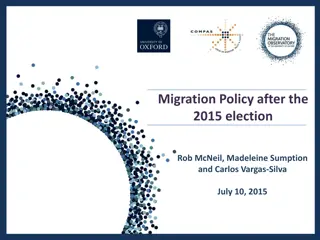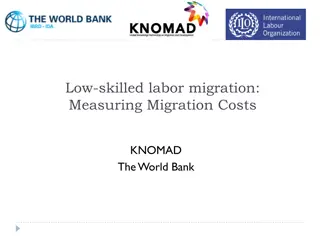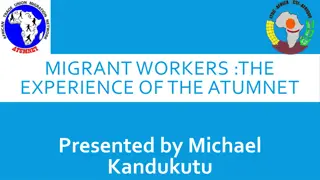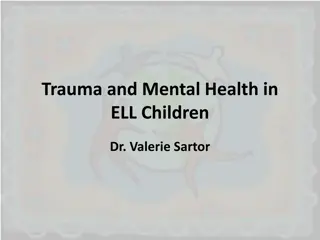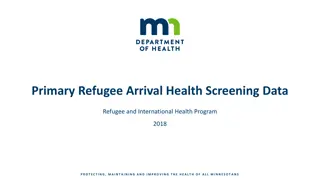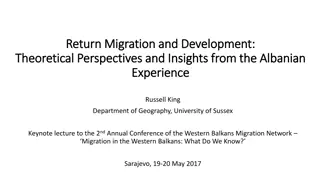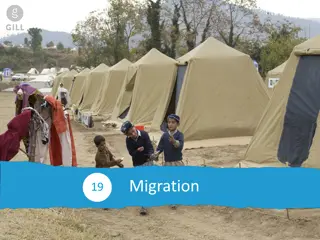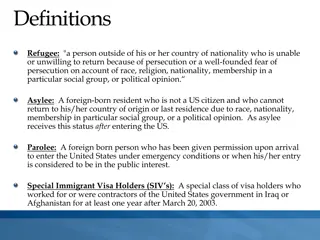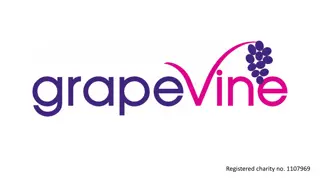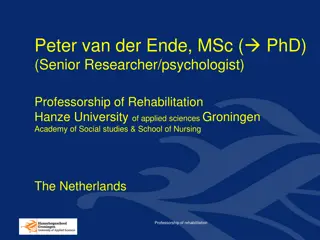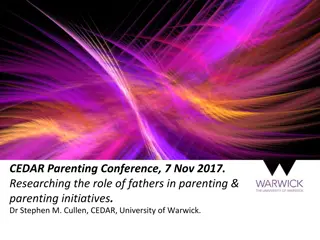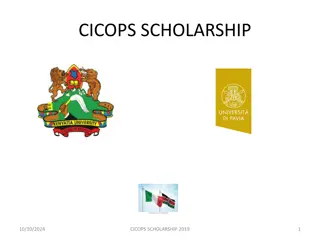Parenting on the Move Program: Empowering Parents in Migration & Refugee Situations
The Parenting on the Move Program aims to empower parents of children up to 12 years old in migration and refugee situations. Developed by CIP-Center for Interactive Pedagogy with support from Save the Children, the program provides comprehensive support focusing on family wellbeing, resilience, and education. By combining psychosocial support, education, and entertainment, the program encourages family cohesion and intercultural exchange, enabling families to tackle challenges proactively. Based on principles like respecting child rights and human rights, the program emphasizes inclusive and non-discriminatory approaches with voluntary participation.
Download Presentation

Please find below an Image/Link to download the presentation.
The content on the website is provided AS IS for your information and personal use only. It may not be sold, licensed, or shared on other websites without obtaining consent from the author. Download presentation by click this link. If you encounter any issues during the download, it is possible that the publisher has removed the file from their server.
E N D
Presentation Transcript
PARENTING ON THE MOVE PARENTING ON THE MOVE Program for empowerment and promoting the development of competencies of parents of children up to 12 years of age, in situations related to migrations and refugeehood ChildHub - Child Protection Hub 22.04.2021. 1
CIP CIP- -CENTER FOR INTERACTIVE PEDAGOGY CENTER FOR INTERACTIVE PEDAGOGY Our Mission is to improve the conditions in which children and youths in Serbia live by - empowering them and the adults, An association established in 1998 to pursue education-related goals - raising the professional capacities of experts, - advocating democratic values Belgrade, Republic of Serbia - bringing together individuals and organizations to act together. 2
MAIN AREA OF INFLUENCE MAIN AREA OF INFLUENCE Improving the quality, accessibility and justice of pre-university education Improving Supporting families through program and material for parents and children Supporting Empowering individuals, institutions and organizations Empowering 3
PARENTING ON THE MOVE Program was developed by the CIP-Center for Interactive Pedagogy, with support from Save the Children. Beneficiaries are parents of children up to 12 years of age (with a focus from 6 to 12). It is designed to be a part of a system of comprehensive support for families in migrations (living conditions, health and safety, information provision about rights, including children in schooling). 4
THE AIM OF THE PROGRAM THE AIM OF THE PROGRAM To support families to provide the necessary conditions for wellbeing, resilience and education of children up to 12 years of age, in situations of migration/refugeehood. AIM of the Program Parenting on the Move The Program combines psychosocial support, education and entertainment; encourages family cohesion and intercultural exchange. Families are supported to develop a constructive approach to challenges and be pro- active within the given circumstances 5
THE PROGRAM IS BASED ON THE THE PROGRAM IS BASED ON THE FOLLOWING PRINCIPLES FOLLOWING PRINCIPLES Respecting of the rights of the child and human rights Acting in the best interest of children and adults Participation of children and parents Inclusive and non-discriminatory approach Voluntary participation Building upon previous experience of the participants and their personal and family strengths Respect of individual, familial, cultural, religious and other differences Respect for the participants personal boundaries 6
THE PROGRAM RESPONDS TO THE NEEDS OF THE THE PROGRAM RESPONDS TO THE NEEDS OF THE FAMILIES ON THE MOVE BY: FAMILIES ON THE MOVE BY: 1. Supporting parents in recognizing and reinforcing personal and family strengths and learning how to manage their stress. Encouraging the development of parental competencies to allow them to best respond to their children s needs. Supporting parents and children (and other family members) in maintaining and reinforcing their mutual connection and find constructive ways to spend their free time. Encouraging children and adults to better understand the similarities and differences of cultural patterns of their own and other families, and the environment they are staying in, to respect diversity and value intercultural exchange. 2. 3. 4. 7
FROM ASSESMENT TO PROGRAM FROM ASSESMENT TO PROGRAM Needs assessment FG with migrant parents, teacher and NGO s activists Final version addressing needs of families with preschool children Drafting Program Piloting several workshops External Evaluation Fine-tuning Implementation with 27 families 8
PROGRAM STRUCTURE PROGRAM STRUCTURE Activities at family settings Family workshops Parent workshops 9
PROGRAM MODULES Module 2: Psychosocial support to parents and children Module 1: Daily routines, protecting children's health and safety FAMILY Module 3: Positive discipline Family Workshops Module 4: Education and lifelong learning 10
Scenarios for parents workshops Scenarios for family workshops Texts/articles Recommendation for program implementation Documentation templates Handbook for moderators 11
TEXTS (ARTICLES) FOR FACILITATORS TEXTS (ARTICLES) FOR FACILITATORS 1. 2. Daily routines, protecting children s health and safety. Personal and family strengths to be able to overcome stress and support children s well-being and resilience. Applying positive discipline in everyday parenting. Lifelong learning how parents can support children s learning and education. Self-care while working with vulnerable groups/stress and burn-out regulation. Interculturality. Communication skills. 3. 4. 5. 6. 7. 12
Workshop scenarios include: INTRODUCTION - announcing topic and goals of workshop; topic and goals of workshop; CENTRAL PART one or more activities faclitated by moderator; CLOSING MESSAGE - suming up activities by giving one or several messages to the parents, that encourage them to contemplate and apply the insights and knowledge they gained; GAME FOR RELAXATION - proposal for one or several games for relaxation; EVALUATION evaluating the workshop by participants in agreed way; AGREEMENTS - announcing next workshop and agreeing with parents on the scheduling; Greeting ant thaning for participation. 13
WORKSHOPS FOR PARENTS WORKSHOPS FOR PARENTS 14
WORKSHOPS FOR PARENTS - 4 MODULES 1 Daily routines, protecting children's health and safety (3 workshops) 2 Psychosocial support to parents and children (6 workshops) 3 Positive discipline (3 workshops) 4 Education and lifelong learning (3 workshops) 15
Module 1: DAILY ROUTINES, PROTECTING CHILDRENS HEALTH AND SAFETY Workshop R1: FAMILY HOUR: SETTING UP DAILY ROUTINES Objective: For parents to understand the significance of setting up daily routines, especially in everchanging living circumstances. Workshop R2: FAMILY STRENGTHSHEALTH CARE AND SAFETY OF CHILDREN Objective: for parents to improve their knowledge on health care and safety of children. Workshop R3: PROVIDING FIRST AID TO THE CHILD IN CASE OF SYMPTOMS OF ILLNESS OR INJURY Objective: To inform the parents on how to provide first aid to a child in case of symptoms of illness or injury, before seeing a doctor. 16
Module 1: DAILY ROUTINES, PROTECTING CHILDRENS HEALTH AND SAFETY Contents of the workshops include theoretical inputs and activities that carry the message that: Traveling with children, parents face many challenges, childen grows and develops along the way, master new skills, learns. Childen needs health supervision, conditions for personal hygiene, for regular sleep, play, available parents, daily rhythm. Empower parents not to allow safety, protection, warmth that family provides to children, be disturbed in the conditions of constant uncertainty and frequent changes of place of residence. Focusing parents to maintain and establish family routines in order for children to develop the habits necessary to maintain their health and safety. 17
Module 2: PSYCHOSOCIAL SUPPORT FOR PARENTS AND CHILDREN Workshop R5: MY STRENGTHS Objective: For parents to develop a positive self-image, gain confidence and self-respect. Workshop R6: FAMILY STRENGTHS Objective: For parents to gain an insight into their family s strengths and find inspiration in them. Workshop R7: THE FIELD OF PERSONAL IMPACT Objective: to steer the parents to their zone of personal impact, so as to not waste time and effort on what is outside their influence. 18
Module 2: PSYCHOSOCIAL SUPPORT FOR PARENTS AND CHILDREN Workshop R8: PSYCHOSOCIAL WELLBEING AND RESILIENCE OF THE CHILD Objective: For parents to understand what psychosocial wellbeing and resilience of the child are, and how they can support their development. Workshop R9: MANAGING PERSONAL STRESS Objective: For parents to better recognize stressors, how they react to them and to learn prevention and management strategies. Workshop R10: HELPING A CHILD COPE WITH STRESS Objective: To help parents better understand the causes and children s reactions to stress and how to help them. 19
Module 2: PSYCHOSOCIAL SUPPORT FOR PARENTS AND CHILDREN Contents of the workshops include theoretical inputs and activities that carry the message that: Each of us have experienced stress, some of us cope better, some worse. If we do not look into causes, reactions and coping strategies, we are at risk from being overwhelmed by stress and having it endanger our functioning and health. Parents have a responsibility not just to themself, but also, to their children, to fight stress actively and efficiently. Family should show love and support, accept childen, and encourage them to develop positive self-image, self-confidence and self-esteem. Having faith in ourselves and recognizing our own strengths an what we can do is very important not only for personal well-being and resiliance, but also can have big impact on our children. Children learn from what they see, not what are told to do. 20
Module 3: POSITIVE DISCIPLINE IN EVERYDAY PARENTING Workshop R11: CHILD NEEDS BOTH WARMTH AND STRUCTURE Objective: For parents to understand the concept of positive discipline and find motivation to apply it. Workshop R12: EDUCATING THE CHILD TODAY, THINKING OF TOMORROW Objective: For the parents to understand how their short-term and long-term goals related to the child affect the way they bring up their children. Workshop R13: PUNISHMENT-FREE UPBRINGING Objective: For the parents to accept it is possible to bring up a child without punishment and to learn how to do so. 21
Module 3: POSITIVE DISCIPLINE IN EVERYDAY PARENTING Contents of the workshops include theoretical inputs and activities that carry the message that: Providing warmth, love, support and encouragement has a positive effect on development of each child's potential in accordance with needs and abilities. It is important to establish a balance between warmth and control, love and clear rules. All challenges during growth, development and upbringing of a child should be opportunity for the child to build what contributes to its successful functioning today in the existing environment and in of the future. Respect for culture, tradition and family values does not preclude consideration of options and methods of upbringing without punishment under the guidance of caring parents or guardians full of attention and love who set clear and reasonable boundaries. 22
Module 4: EDUCATION AND LIFELONG LEARNING Workshop R14: EVERYONE LEARNS IN THEIR OWN WAY Objective: For the parents to understand that children learn in different ways and to see how they can support their learning. Workshop R15: COMPETENCIES FOR LIFELONG LEARNING Objective: To acquaint the parents with competencies for lifelong learning, to explain their importance for education and preparation for work. Workshop R16: HELPING CHILDREN INTEGRATE INTO AN EDUCATIONAL SYSTEM Objective: For the parents to understand their significance and role in supporting their children with integration into education, and during their schooling. 23
Module 4: EDUCATION AND LIFELONG LEARNING Before we start, please learn this sentence in the next 30 seconds: U enje mo e biti zabavno, ako je dobroosmi ljeno. 24
Module 4: EDUCATION AND LIFELONG LEARNING Contents of the workshops include theoretical inputs and activities that carry the message that: and the example they give set the tone of the child s attitude to learning and their achievements 25
FAMILY WORKSHOPS FAMILY WORKSHOPS 26
Family Workshops Workshop P1: THE MEANING OF A NAME Objective: Forr the participants to take a look into the significance of a person s name in the development of their identity, to share experiences and learn about names in other cultures. Workshop P2: THE STORY OF OUR FAMILY Objective: For families to get to know each other and bond, by exchanging stories on interesting, beautiful and funny moments in life. Workshop P3: MOTIFS FROM OUR HOMELAND Objective: For families from different cultural backgrounds to get to know each other and bond through an exchange on family customs related to celebrations and commemorations of important dates. 27
Family Workshops Workshop P4: CELEBRATIONS AND HOLIDAYS Objective: For families from different cultural backgrounds to get to know each other and bond through an exchange on family customs related to celebrations and commemorations of important dates. Workshop P5: SOCIALIZING WITH MUSIC AND DANCE Objective: To get the families to bond and relax with music and dance. Workshop P6: OUR JOURNEY Objective: for the families to collect their impressions of their journeys in a creative way, to remember what they learned and where, and how they can use that knowledge. 28
Family Workshops Workshop P7: OUR QUIZ Objective: For families to bond and socialize by solving puzzles. Workshop P8: LOGICAL AND MATHEMATICAL GAMES Objective: To encourage the development of logical and mathematical thinking in children.. Workshop P9: CHILDREN FILMMAKERS Objective: To encourage creative expression among children, using visual media 29
Family Workshops Contents of the workshops include theoretical inputs and activities that carry the message that: Spending time with all family members in family activities is very important. It provides opportunities to get to know each other better, to play, learn, share interests, have fun, strenghten family cohesions. Family activities do not require special equipment or certain facilities. Focus is on using what is avalilable (recources), being creative and planning time for joint activities. These activities is opportunity to include other families, to get to know them, exchange experiences, get to know different culture and talk about ours, make friends and celebrate diversity. 30
PROGRAM MATERIAL FOR FAMILIES PROGRAM MATERIAL FOR FAMILIES 31
PROGRAM IMPLEMENTATION PROGRAM IMPLEMENTATION App. four months of implementation one workshop for parents per week Closing workshop Introductory workshop Family workshops are organized in parallel, one per week Family workshops Workshops for parents
FACILITATORS FACILITATORS Facilitators experts, students or activists sensitive to the needs of families on the move experience with families on the move trained to provide psychosocial support to vulnerable groups trained/experienced for work with children and families good communication skills Training and supervision should be based on knowledge and experience of the facilitators; it can be extended as needed 34
QUALITY ASSURANCE QUALITY ASSURANCE 2 days follow up training mentoring supervision mentoring supervision 3days training 35
Handbook for trainers and mentors Training modules (2) Recommendations 36
PROGRAM EVALUATION: MOTHERS SAY "I learned that I would not beat my son and that I would not educate him the old way, as everyone did. I used to think that if a kid goes wrong, you have to beat him to keep him from repeating. Now I've learned that it's not so "We learned how to love our families, what to do when a kid has a problem, how to get kids into school, how to be flexible and live better at camp with other cultures. We have a lot of free time, it is important for us to be together, to talk, to become friends "We have learned to look at things from a different angle, if it is difficult for us, not to crochet and to solve the problem ourselves" "It's very useful, we're in a camp like a prison. It helps us to live more easily here. We talk about the problems we have 37
workshops for parents with children of preschool age PLANS FOR FURTHER PROGRAM DEVELOPMENT audio and video material for parents remote training modules 38
Contact: Contact: e-mail: cipcentar@cipcentar.org Facebook page: facebook.com/CIPCentar/ Web site: http://www.cipcentar.org/ CIP Center for Interactive Pedagogy from 1998 is working towards improving the conditions for the exercise of rights by children in Serbia and their development and learning. We translate contemporary theoretical knowledge and good practices into policies, quality inclusive education models, programs for children and families and trainings.










